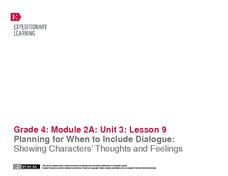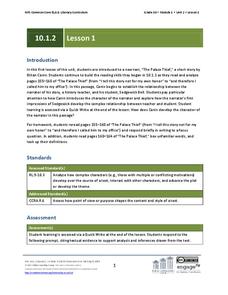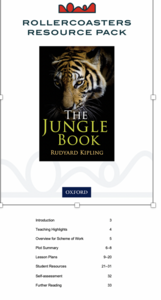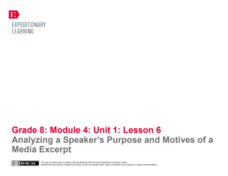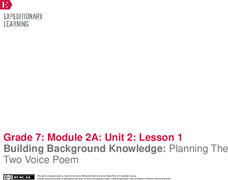EngageNY
Grade 9 ELA Module 1, Unit 1, Lesson 7
A story about feral girls raised by werewolves will have some interesting character development! Track how the girls and their teachers act, speak, and change with a lesson focused on Karen Russell's "St. Lucy's Home for Girls Raised by...
EngageNY
Revising for Organization: Timely Transitions
During the eighth lesson in a historical fiction unit, pupils practice thoughtfully transitioning their ideas sequentially. After the teacher models how to add these transitions using the Wheelwright draft created in a previous lesson,...
EngageNY
Reviewing Conventions and Editing Peers’ Work
Encourage young writers to edit text based on conventions. After reviewing the conventions, fourth graders watch a teacher demonstrate how to revise a paragraph for correct spelling, capitalization, punctuation, or dialogue. Then, pairs...
EngageNY
Planning for When to Include Dialogue: Showing Characters’ Thoughts and Feelings
Young writers examine dialogue conventions, including indentation, quotation marks, and expressing thoughts and feelings through a fictional text. By noticing where and when authors use dialogue, they decide how to incorporate dialogue...
EngageNY
Writing: Drafting Body Paragraphs and Revising for Language
Begin the drafting phase of the writing process with a lesson plan focused on logically writing three body paragraphs. Then, revise the writing to make it more formal after a teacher-directed mini-lesson plan. Each paragraph highlights...
EngageNY
End of Unit 2 Assessment: Final Draft of Literary Argument Essay
Take the last step in writing a literary argument essay using Bud, Not Buddy by Christopher Paul Curtis in an activity focused on feedback. Using the stars and steps revision method, pupils consider teacher and peer feedback to revise...
EngageNY
Grade 10 ELA Module 1: Unit 2, Lesson 1
The complex relationship between a teacher and his student takes center stage in an instructional activity that asks readers to pay close attention to how author Ethan Canin introduces his characters and how he develops the character of...
Oxford University Press
The Jungle Book
Most every teacher dreams of a ready-to-teach and print book study. Well, here it is! The Jungle Book novel resource includes 12 complete lessons studying poetry, author's craft, themes, characters, and more. Scholars role play, research...
EngageNY
Grade 10 ELA Module 3: Unit 2, Lesson 5
Have you ever argued for the sake of argument? Scholars dig into what makes a compelling argument. They learn to create evidence-based arguments using a teacher-led model. Once finished, they use an evidence-based checklist to guide...
EngageNY
Grade 10 ELA Module 3: Unit 3, Lesson 8
All is fair in claims and counterclaims. Scholars continue to work on their argumentative writing pieces by ensuring their papers fairly address claims and counterclaims. Writers review the importance of argumentative writing conventions...
EngageNY
Grade 10 ELA Module 3: Unit 3, Lesson 7
What's your style? Writers examine wording to add formal style and objective tone to their argumentative papers. After looking at examples of sentences, learners use turn and talk to discuss which sentences have a formal style before...
EngageNY
Inferring about Character: Close Reading of the Poem “Inside Out” and Introducing QuickWrites
Grab a partner! Scholars partner up to take a second look at the verse novel Inside Out & Back Again. They discuss questions about and connections to the novel and then learn how to complete a Quick Write task properly. To finish,...
EngageNY
Inferring About Character: Atticus (Chapter 5)
As part of their study of Harper Lee's To Kill a Mockingbird, class members participate in a silent discussion of the novel using a Chalk Talk chart. They then respond to the teacher's questions by writing their thoughts on the chart....
EngageNY
End of Unit 2 Assessment, Part 2: Revise Essay Drafts
Positive feedback is a great way to improve writers' skills. Scholars receive their draft essays back with teacher comments and start the revision process. Next, they prepare to begin their final drafts at home.
EngageNY
Advocating Persuasively in a Fishbowl: Practice
What makes a good advocate? An informative lesson plan teaches class members how to advocate persuasively. They participate in a fishbowl activity and listen to the teacher model advocating persuasively. They then practice independently,...
EngageNY
Analyzing a Model Essay: “Challenges Facing a Lost Boy of Sudan”
Copy that! Writers carefully analyze a model essay to gain a better understanding of their upcoming essays about A Long Walk to Water. They begin by circling unfamiliar words in the model as teachers read it aloud. They then pinpoint...
EngageNY
Analyzing a Speaker’s Purpose and Motives of a Media Excerpt
Middle schoolers listen to a media clip of a teacher-selected speech and analyze it for speaker's purpose using a Speaker’s Purpose graphic organizer. Pupils pair up to discuss their completed organizers and add any new information they...
EngageNY
Independent Reading Celebration and Read-Aloud of the Myth of Pygmalion
Let's party! Class members spend the first 25 minutes celebrating their independent reading efforts through an activity the teacher chooses. They then take a glimpse into the next unit of study, Pygmalion Myth Read-aloud and discus about...
EngageNY
End of Unit 1, Assessment, Part 2: Revise Essay Drafts
As a culminating unit activity, pupils revise their argumentative essays based on the novel Lyddie by Katherine Paterson. Paying careful attention to grammar, punctuation, and vocabulary, they incorporate teacher feedback to revise and...
EngageNY
Building Background Knowledge: Planning The Two Voice Poem
Scholars build background knowledge to understand the life and work of the union leader and labor organizer César Chávez. As they read teacher-selected resources, they complete a Building Background Knowledge worksheet and engage in...
EngageNY
Building Background Knowledge: Introducing Pygmalion
Learners take a gallery walk around the room to view images and text of Victorian England culture and then complete a Predictions Walk note-catcher as they circulate and take turns reading quotation strips from Pygmalion. Class members...
EngageNY
The Performance Task: The Children’s Book—Final Draft
All good stories must come to an end. Writers review teacher feedback from their Children's Book Storyboards and make plans for revision. Next, they begin writing their final drafts and putting them together with their illustrations.
EngageNY
Mid-Unit Assessment: Using Evidence to Support Analysis: “Frederick Douglass”
Show what you know! Scholars complete a mid-unit assessment using text evidence from Frederick Douglass. The teacher then presents expectations for independent reading assignment. Leaving the class, pupils turn in an exit ticket...
EngageNY
End of Unit Assessment, Part 1: Revising Claims and Evidence Based on Feedback
Revisit, revise. Scholars receive their position papers returned with feedback from the teacher. They use colored pens to identify feedback related to the first two rows of the rubric and correct their papers based on the comments....





